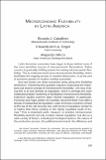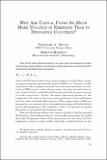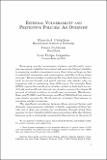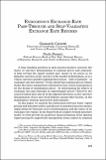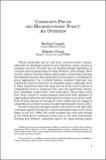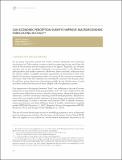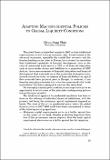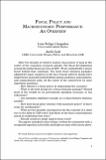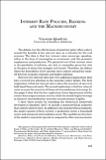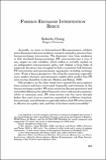Buscar
Mostrando ítems 11-20 de 40
Microeconomic flexibility in Latin America
Latin American economies have begun to leave behind some of the most primitive sources of macroeconomic fluctuations. Policy concern is gradually shifting toward increasing microeconomic flexibility. This is a welcome trend since microeconomic flexibility, which facilitates the ongoing process of ...
Why are capital flows so much more volatile in emerging than in developed countries?
One of the most studied subjects in open macroeconomics is what determines capital flows. In general, most papers are concerned with estimating the following regression. where the left-hand side is some measurement of capital flows, either as a percentage of gross domestic product (GDP) or as changes, ...
External vulnerability and preventive policies: an overview
Emerging market economies endure significantly more macroeconomic volatility than industrial countries. Output volatility in emerging market economies is more than twice as large as that in industrial economies, and consumption volatility is three times as large. Recent studies corroborate the view ...
Endogenous exchange-rate pass-through and self-validating exchange rate regimes
A long-standing question in open macroeconomics concerns the choice of currency denomination of nominal prices and contracts. A firm serving the export market may choose to set prices in its domestic currency in the currency of the market of destination or in a vehicle currency possibly indexing these ...
Commodity prices and macroeconomic policy: and overview
World commodity prices and their macroeconomic impact especially on emerging economies have long been a main concern in economic research. Decades ago the Prebisch-Singer hypothesis of secularly deteriorating terms of trade (Prebisch 1950 Singer 1950) was the subject of intense debate and became a ...
Can economic perception surveys improve macroeconomic forecasting in Chile?
Comparamos el momento, la representatividad, los cuestionarios y la agregación de las respuestas de cinco encuestas de percepción económica chilenas en sus proyecciones macroeconómicas, observando las deficiencias de los índices agregados que combinan preguntas con diferente enfoque y perspectiva ...
Adapting macroprudential policies to global liquidity conditions
The global financial crisis that erupted in 2007 has had intellectual repercussions as well as large economic costs. Recent events in the advanced economies especially the capital flow reversals and the looming banking sector crises in Europe have shaken the conviction that traditional yardsticks of ...
Fiscal policy and macroeconomic performance: an overview
After two decades of relative neglect fiscal policy is back at the center of the economics research agenda. The fiscal developments around the global financial crisis of 2007–09 are undoubtedly a major factor behind that comeback. The large fiscal stimulus packages adopted by many countries in the ...
Interest rate policies banking and the macroeconomy
The debate over the effectiveness of monetary policy often centers around the benefits of low interest rates as a stimulus for the real economy. The idea is that low interest rates encourage spending either in the form of consumption or investment and this promotes employment and production. The ...
Foreign exchange intervention redux
Arguably no issue in International Macroeconomics exhibits more dissonance between academic research and policy practice than foreign-exchange intervention. The dominant view from academia is that sterilized foreign-exchange (FX) intervention has a tiny if any impact on real variables which makes it ...

